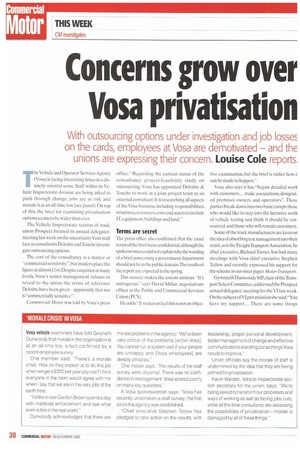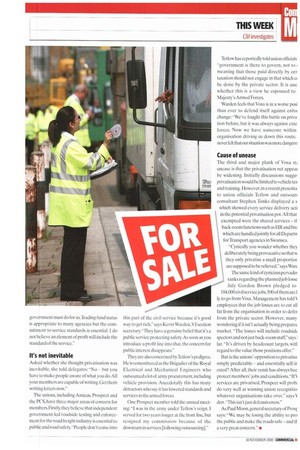Concerns grow over Vosa privatisation
Page 30

Page 31

If you've noticed an error in this article please click here to report it so we can fix it.
VVith outsourcing options under investigation and job losseE on the cards, employees at Vosa are demotivated — and the unions are expressing their concern. Louise Cote reports.
The Vehicle and Operator Services Agency (Vosa) is facing interesting times in a distinctly oriental sense. Staff within its Vehicle Inspectorate division are being asked to push through change, jobs are at risk and morale is at an all-time low (see panel). On top of this, the brief for examining privatisation options seems to be wider than ever.
The Vehicle inspectorate section of trade union Prospect focused its annual delegates' meeting last week on the uncertainty Vosa staff face as consultants Deloitte andTouche investigate outsourcing options.
The cost of the consultancy is a matter of -commercial sensitivity",but insiders place the figure at almost £1 m. Despite enquiries at many levels. Vosa's senior management refuses to reveal to the union the terms of reference Deloitte have been given apparently that too is"commercially sensitive".
Commercial Motor was told by Vosa's press office: "Regarding the current status of the consultancy project/feasibility study on outsourcing: Vosa has appointed Deloitte & Touche to work in a joint project team as an external consultant. It is researching all aspects of the Vosa business, including responsibilities, struct ures,resources, costs and assets to include IT.equipmen t, buildings and land."
Terms are secret Thc pros office also confirmed that the exact te nns of the brief were confidential, although the spokeswoman could not explain why the wording of a brief concerning a government department should not be in the public domain.The results of the report are expected in the spring.
This secrecy makes the unions anxious. "It's outrageous," says David Millar, negotiations officer at the Public and Commercial Services Union (PCS).
He adds:"It makes us feel this is not an objec live examination, but the brief is rather how ii can be made to happen."
Vosa also says it has "begun detailed work with customers... trade associations, designated premises owners and operators". These parties break down into two basic camps: those who would like to step into the lucrative work of vehicle testing and think it should be outsourced, and those who will remain customers.
Some of the truck manufacturers are keen on the idea of absorbing test management into their remit, as is the Freight Transport Association. It chief executive, Richard Turner, has had many meetings with Vosa chief executive Stephen Tetlow and recently expressed his support for the scheme in our sister paper MotorTransport.
Gywnneth Dunwoody MP,chair of the Transport Select Committee, addressed the Prospect annual delegates' meeting for the VI last week. On the subject of VI privatisation she said:" You have my support... There are some things government must do for us.Trading fund status is appropriate to many agencies but the commitment to service standards is essential. I do not believe an element of profit will include the standard of the service."
It's not inevitable
Asked whether she thought privatisation was inevitable, she told delegates: "No hut you have to make people aware of what you do. All your members are capable of writing. Get them writing letters now.
The unions, including Amicus, Prospect and the PC'S, have three major areas of concern for mem hers. Firstly, they believe that independent government-led roadside testing and enforcement for the road freight industry is essential to public and road safety." People don't come into this part of the civil service because it's good way to get rich."says Kevin Warden,VI section secretary. They have a genuine belief that it's a public service protecting safety. As soon as you introduce a profit line into that, the concern for public interest disappears."
They are also concerned by Tetlow's pedigree. He is remembered as the Brigadier of the Royal Electrical and Mechanical Engineers who outsourced a lot of army procurement, including vehicle provision. Anecdotally this has many detractors who say it has lowered standards and services in the armed forces.
One Prospect member told the annual meeting: "I was in the army under Tetlow's reign. I served for two years longer at the front line, but resigned my commission because of the downturn in services [following outsourcing]." Tetlow has reportedly told union officials "government is there to govern, not to meaning that those paid directly by cer taxation should not engage in that which el be done by the private sector. It is unc whether this is a view he espoused to Majesty's Armed Forces.
Warden feels that Vosa is in a worse posi than ever to defend itself against enfot change: "We've fought this battle on priva tion before, but it was always against exte forces. Now we have someone within organisation driving us down this route. never felt that our situation was more danger°
Cause of unease
The third and major plank of Vosa st; unease is that the privatisation net appeai be widening. Initially discussions sugge: privatisation would be limited to vehicle tes and training. However,in a recent presenta to union officials Tetlow and outsourt consultant Stephen Tonks displayed a s which showed every service delivery acti in the potential privatisation pot. All that exempted were the shared services if back-room functions such as HR and fim which are handled jointly for all Departn for Transport agencies in Swansea. "Cynically you wonder whether they deliberately beingprovocative SO-that w they only privatise a small proportior are supposed to be relieved "says Ware The same kind of cynicism pervade5 ranks regarding the planned job losse July Gordon Brown pledged to 104,000 civil service jobs,500 of them are I ly to go from Vosa. Management has told N employees that the job losses are to cut all fat from the organisation in order to defer from the private sector. However, many wondering if it isn't actually being preparet market. "The losses will include roadside spectors and not just back-room staff,"says1 lar. "It's driven by headcount targets, wit} regard to the value those positions offer." But is the unions' opposition to privatisa simply predictable and essentially self-jr ested? After all, their remit has always bee protect members' jobs and conditions. 1f services are privatised. Prospect will prob4 do very well at winning union recognitio what ever organisations take over," says N den. This isn't just defensiveness."
As Paul Moon,general secretary of Prosi says: "We may be losing the ability to pro the public and make the roads safe and if a very great concern." •


















































































































































































